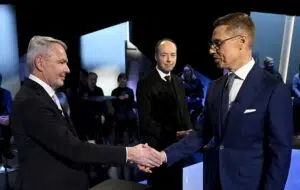Brussels – A last-ditch head-to-head contest left the race for Finland’s presidency wide open until the very end. Coming out on top in the end was the candidate of the center-right National Coalition Party, Alexander Stubb, who with 51.6 percent of the vote in yesterday’s (Feb. 11) runoff prevailed over his Green League challenger, former Foreign Minister Pekka Haavisto. As of March 1, when Stubb takes office as Finland’s new president, the highest institutional offices in the Scandinavian country will all be in conservative hands.

After winning the first round last Jan. 28, Stubb also narrowly won the runoff in a particularly well-participated round of voting (the affluenza at the polls yesterday was 67.6 percent, although down from a record 71.5 two weeks ago). “I believe that Finland now has a good president of the Republic, Alexander Stubb is an experienced and competent person for the job,” acknowledged the challenger Haavisto, who after serving as minister for international development between 2013 and 2014 and as foreign minister in the government led by Sanna Marin between 2019 and 2023 was aiming for the country’s highest institutional office. Instead, the post will be given to the former leader of the same National Coalition Party (until 2016), today in government with the far-right True Finns: in less than a yearthe Scandinavian country has moved from the center-left to the right (popular, but leaning conservative) political chessboard, with the premiership going to Petteri Orpo and the presidency to Stubb.
The main role of the president of Finland is toguide the country’s foreign policy in cooperation with the government, representing Helsinki at the NATO tables after the historic entry takes place on April 4, 2023. In addition, the President of the Republic acts as commander-in-chief of the military, appoints and accepts the resignations of members of the executive branch, high-ranking civil servants, and Supreme Court judges. Finally, at the justified request of the prime minister, he can order the dissolution of the Eduskunta (Finland’s single-chamber parliament) and call early elections. The previous president,Sauli Niinistö (in office from 2012 until the end of February), is still particularly well-liked in the country, but constitutional rules since 1994 dictate that the presidential office cannot be renewed after two consecutive terms, each lasting six years.
 Stubb was foreign minister between 2008 and 2011 and premier between 2014 and 2015, before serving as vice president of the European Investment Bank between 2017 and 2020. A strong pro-European background, peppered with unwavering support for Ukraine after the Russian invasion in 2022, which led him to extremely tough stances toward Russia. Two political traits that immediately put him in a good light in Brussels: “Finland is at the forefront of Europe’s security,” stressed the president of the European Council, Charles Michel, ribalding that Stubb’s “experience and leadership” “will be an asset to strengthen our common foreign and security policy in these difficult times.” Similar words were chosen by the number of the EU Commission, Ursula von der Leyen: “With your leadership, experience and European commitment, our Union has a strong new resource,” are the congratulazioni to Stubb, reminding that “the challenges ahead are many, but we count on your renowned energy and dedication.” The chairwoman of the EU Parliament, Roberta Metsola, also wanted to highlight the fact that she knows her colleague from the same European political family (the EPP) as “a solid leader, a proud Finn, and a committed European.” Speaking to the press after yesterday’s victory, the newly appointed president of Finland called the post “the greatest honor of my life” and said he was “grateful that Finns voted in such large numbers.”
Stubb was foreign minister between 2008 and 2011 and premier between 2014 and 2015, before serving as vice president of the European Investment Bank between 2017 and 2020. A strong pro-European background, peppered with unwavering support for Ukraine after the Russian invasion in 2022, which led him to extremely tough stances toward Russia. Two political traits that immediately put him in a good light in Brussels: “Finland is at the forefront of Europe’s security,” stressed the president of the European Council, Charles Michel, ribalding that Stubb’s “experience and leadership” “will be an asset to strengthen our common foreign and security policy in these difficult times.” Similar words were chosen by the number of the EU Commission, Ursula von der Leyen: “With your leadership, experience and European commitment, our Union has a strong new resource,” are the congratulazioni to Stubb, reminding that “the challenges ahead are many, but we count on your renowned energy and dedication.” The chairwoman of the EU Parliament, Roberta Metsola, also wanted to highlight the fact that she knows her colleague from the same European political family (the EPP) as “a solid leader, a proud Finn, and a committed European.” Speaking to the press after yesterday’s victory, the newly appointed president of Finland called the post “the greatest honor of my life” and said he was “grateful that Finns voted in such large numbers.”







